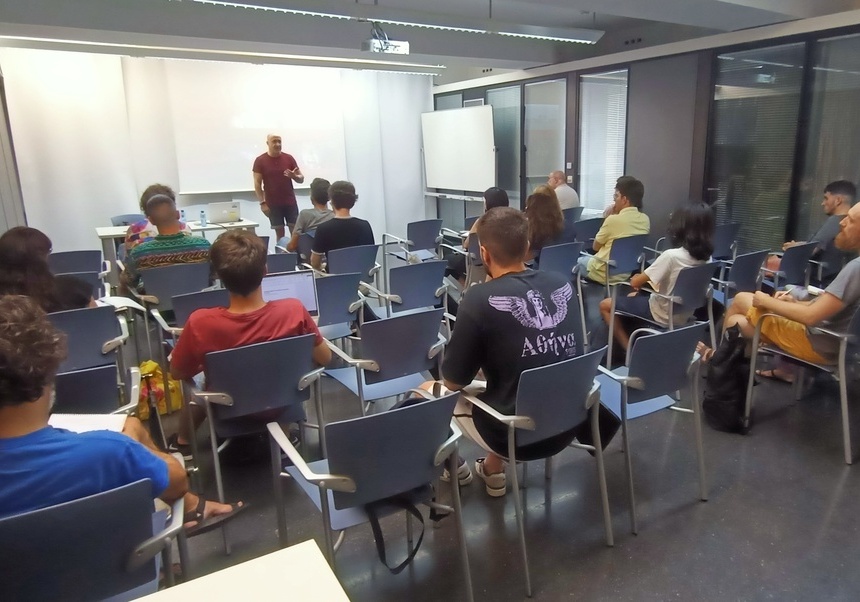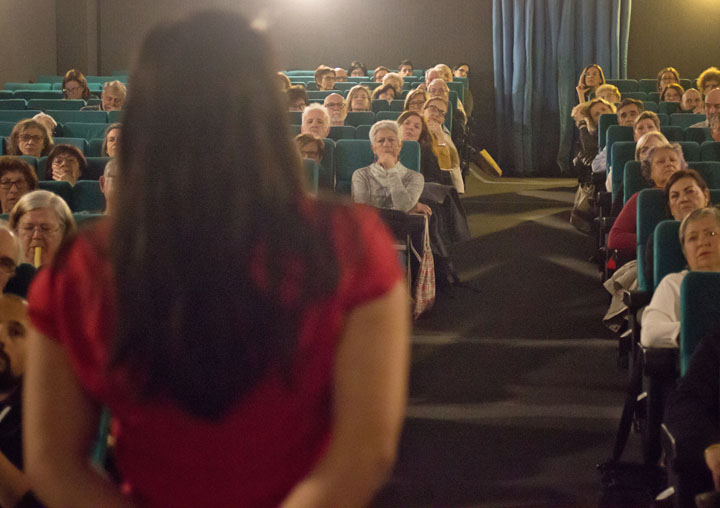The Universitat de València launches DocuVir.20, an online short film festival about the positive aspects of confinement
- Office of the Vice-Principal for Culture and Society
- April 6th, 2020
La Nau Cultural Centre of the Universitat de València in collaboration with the UV General Foundation organises DocuVir.20, an online short film festival about the new forms of sociability and solidarity in the times of COVID-19. The event is also organised thanks to the support of the Valencian government (Generalitat Valenciana) and the City Council of Valencia. In July, the event organisers display the works selected via the YouTube channel of La Nau and give two cash prizes for the best short film and the most voted work by the public.
Docuvir.20 is an initiative organised by the Office of the Vice-Principal for Culture and Sport and the UV General Foundation with the help of the university Cinema Club and the Culture Observatory. The event shall take place in the form of the short film laboratory for the same of socio-cultural innovation. General Directorate of Cultural and Natural Heritage of the Valencian government (Generalitat Valenciana) and the Department of Youth of the City Council of Valencia collaborate within the project as well. In these times of pandemic and global confinement, the event aims to show the positive aspects of the historical experience which is having a deep impact on all dimensions of human lives.
Specifically, a festival will be open to participation for any person of legal age who seeks to share their ideas through audiovisual works as well as reflect on socialising and solidarity practices in this unprecedented situation. The organisers chose the work of a Valencian graphic artist and designer Patricia Bolinches as the image of the festival.
The call for applications will be open until 20 May. The works to be accepted for review include the experimental movie pieces, creative documentaries, and other similar formats with a minimum duration of 30 seconds and the maximum of 3 minutes. To shoot a short movie, a person may use all kinds of media or devices which allow recording the image and sound, as well as any other editing software. An applicant may reuse the material shot before the COVID-19 pandemic as long as it serves to reflect on the issue of the festival. The language of the movie should be Spanish, Valencian, or English, or any other language as long as the subtitles in one of the abovementioned three languages are provided. The application should be sent online via the festhome.com platform, and each participant can send as many proposals as he/she wants.
The selected works will be displayed openly on the YouTube channel of the La Nau Cultural Centre between 1 and 30 June. The Official Jury Committee comprising the experts in the cultural field will award the winning best short film with 350 euros. Meanwhile, the Award of the Public of 150 euros shall be given for the work which received the most votes from the audience during June.
The Vice-Principal for Culture and Sport, Antonio Ariño, explains that “we [the organisers] have been carrying the idea of the socio-cultural laboratory in mind for many years now; we have tried to put it to practice but never managed to come to an agreement. But now, in these circumstances, we have to use our imagination: start working online and explore new forms of greeting, communicating, conveying trust and, most importantly, solidarity.” The university launches an online short movie festival because, according to Ariño, “we surely need a COVID-19 vaccine as soon as possible, but we will also need socio-cultural antidotes so that the inequalities are not exacerbated after pandemic, bullying is not easily circulates, and there is no pretext to jeopardize democracy. This is the objective of DocuVir.20: to prepare an equal future for all.”
Meanwhile, Carmen Amoraga, a general director of the Department of Cultural and Natural Heritage of the Valencian government, outlines the importance of institutional collaboration “to carry out the projects which affect the citizenship, just like DocuVir.20, especially in such difficult times.” She also stresses that “the Universitat de València is an essential social space for the Valencian government” and affirms that “it is an honour to work together for the culture and for the creative business in this terrible moment of sanitary crisis.” Meanwhile, a delegate minister of the Department for Education, Cultural Action, Youth and Development Cooperation and Migration of the City Council of Valencia, Maite Ibáñez, ensures that “in a moment when the youth will surely redefine their social relations, we have to stay connected to their new views on the current and future situation.” The minister points out that the format of audiovisual stories is “a perfect space to boost one’s creativity in the times of confinement.” According to Ibáñez, the Department of Youth “is pleased to collaborate with the Universitat de València, Cinema Club, and Culture Observatory on this experience which promotes a sense of participation and innovation and serves as a tool to give voice to the young people.”
As such, DocuVir.20 is born with the idea to contribute to the uncertain and dangerous situation that we live nowadays all around the world. The virus that threatens to infect us in everyday life and has made us self-isolate at home also gives us the opportunity to put our imagination and creativity to service of solidarity and new forms of connection and citizen action.
More information about the festival and its regulations can be found here (in Spanish).
More information:
File in: Cultura , Cinema , Aula de Cinema
















